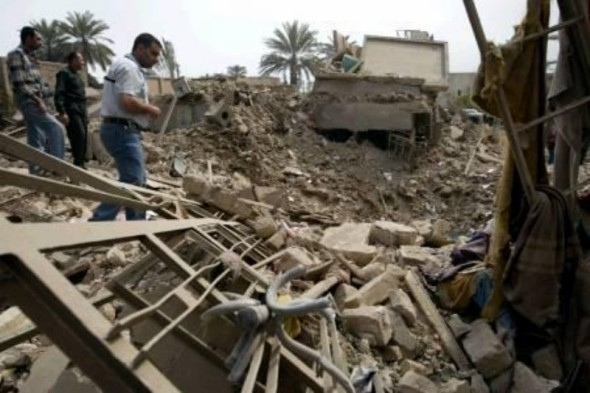
By Anada Devi
Brought to you by the Guernica/PEN Flash Series
They came in broad daylight with their tools and their guns.
You knew there was a burning in their body; there was a yearning for more than a drop of water or a drop of blood.
The flesh was nothing; just a piece of meat to chop off one day at a time, several necks or maybe a hand or two, who knew?
Today they had another job and it filled them with joy. The kind of joy you feel when you’re about to take on giants and goliaths, when you become the true hero of your dreams.
That was what they were built for, these men and boys, constructed from air and wind by words that filled them with wings, that bore them aloft howling devastation because no one, you see, no one could resist the khamsin when it blew across the skin.
They had heard the words: Killing a man is nothing. It only changes the man from live to dead. What you must kill is history. Everything that reminds them of supposed greatness, pretensions of beauty, the hubris of men who should know better than to worship stones, that is what you must erase from the memory of the living. Show them that no monument can resist your breath.
And so they came with their guns and their tools and no time to contemplate Time. No need to see the perfect shapes that had defied the slow trickle of centuries, the curves, the sinuousness, the grace, for they had a gruesome grace of their own as they jumped from the trucks and jumped from the jeeps and jumped from their bodies.
Stone was but stone, and marble belonged to the hills, they said. The patient carving and chiseling of men long gone would not remain to remind us that we could be gods, if we wanted to. That we could create gods from nothing, from earth and sand and glass and the mark of a pen. Nothing would remain to tell us about ourselves. Who we were and who we could become, how the vision of men could give us all the heavens we wished for, or a hell that bulldozed its way through the wonder.
Stone to stone, they said, and they didn’t say, dust to dust. But it would have been just if their bodies had crumbled as they hit and dug and broke and crushed. They flattened walls that had sheltered bodies, and they ground mounds that were made of bones.
Children looked at them, unquestioning. They also held in tentative hands huge monsters of iron, the barking sounds resounding in their little heads throughout the night. Some of them dreamt of bodies exploding. Some of them still sucked their thumb. Some still, perhaps, remembered the taste of their mother’s milk. But they had been snatched and smashed and rebuilt, and there was no going back, no nurturing into tenderness, no calming breath of night on their forehead. They were brittle and sharp; you could cut a finger just trying to touch them.
The sand blew up and covered the rubble.
The trucks left one by one. They looked back and laughed. The glory of their ancestors crushed like a face once beloved, now unknown, beneath a boot.
The rubble did not sleep under the sand. It bled.

